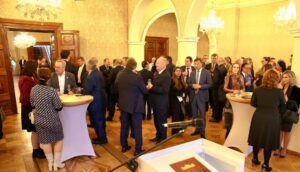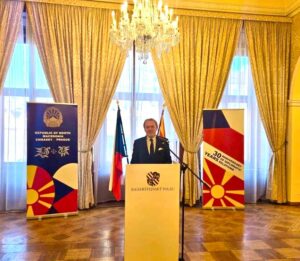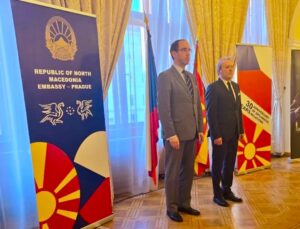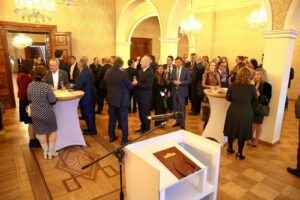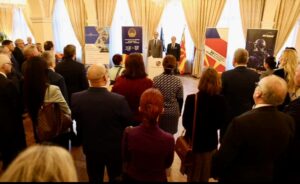- Hans Weber
- March 27, 2025
05.12.2024 Celebrating History and Identity: The National Day of North-Macedonia
On 5th of December H.E. Emil Krsteski Ph.D invited the representatives of the diplomatic corps and North Macedonian locals in the Czech Republic to celebrate together on the premises of the Kaisersteinsky Palace in Prague.
The Deputy of the Cabinet Minister of Foreign Affairs of the Czech Republic Mr. Jan Marian spoke on behalf of the Czech Republic
The National Day of Macedonia, celebrated on August 2nd, holds a special place in the hearts of Macedonians, symbolizing both revolutionary fervor and the enduring quest for sovereignty and identity. Known officially as the Day of the Republic, or “Ilinden” (St. Elijah’s Day), this national holiday marks a historic dual commemoration: the Ilinden Uprising in 1903 and the establishment of the Republic of Macedonia in 1944 during World War II.
Historical Significance
Named after St. Elijah, whose feast day it coincides with, Ilinden is a poignant reminder of Macedonia’s struggle for autonomy and self-determination. The 1903 Ilinden Uprising against the Ottoman Empire was an important milestone in the broader Balkan struggle for independence. Though ultimately suppressed, the uprising set the stage for future national movements and remains a symbol of bravery and perseverance in the quest for national rights and freedom.
Fast forward to 1944, at the heart of World War II, the citizens of what was to become the Socialist Republic of Macedonia (within the Socialist Federal Republic of Yugoslavia) convened the first Anti-Fascist Assembly for the National Liberation of Macedonia (ASNOM). This assembly not only sought liberation from Axis occupation but also laid down the foundations for an autonomous Macedonian state, solidifying national identity and organization.
Celebrations and Traditions
Every August 2nd, Macedonia sees numerous celebrations reflecting both historic and modern significance. The celebrations typically begin in Kruševo, where the 1903 rebellion found its base, holding special events that pay homage to revolutionaries who stood up against the Ottoman Empire. The Monument of Ilinden in Kruševo serves as the focal point for speeches, wreath-laying ceremonies, and cultural performances designed to keep the memory of the struggle alive.
In the capital city, Skopje, the streets fill with parades and public gatherings showcasing Macedonia’s rich cultural tapestry. Folklore dances and music, expressing the ethnic diversity and traditions of the Macedonian people, are performed. This is complemented by traditional cuisine, such as ‘Ajvar’ (pepper spread) and ‘Tavče Gravče’ (bean stew), shared amongst families and friends, bringing people together in communal harmony.
Special exhibitions and conferences offer insights into Macedonia’s historical journey and its evolving identity in the modern world. Additionally, public speeches by government leaders typically address themes of resilience, sovereignty, and the aspirations for international cooperation and peace.
A Celebration of Diversity
The Day of the Republic is also a celebration of Macedonia’s multi-ethnic composition. As communities across the country join in the festivities, there is a conscious effort to recognize and honor the mosaic of ethnicities that collectively define the Macedonian nation. This day serves as an opportunity to reflect upon the contributions of various cultural groups, enhancing national unity through mutual respect and understanding.
Macedonia on the Global Stage
For Macedonian communities abroad, National Day serves as a bridge to their homeland, fostering a strong sense of identity and continuity. Embassies and Macedonian diaspora organizations host cultural events, highlighting traditional arts and crafts, music, and stories that keep ties to their national roots alive. These events serve as an expression of shared heritage and contribute to a broader global appreciation of Macedonian culture.
August 2nd also invites international reflection on Macedonia’s aspirations for greater involvement on the global stage, including pursuits of economic growth, political stability, and membership in international alliances like the European Union.
Envisioning the Future
While rooted in historical struggle, the National Day of Macedonia is a forward-looking celebration that underscores a commitment to democratic values, national integrity, and peace. It reaffirms the ongoing journey towards social and economic advancement, emphasizing unity and resilience.
August 2nd is not only a day of remembrance but also one of reaffirmation for Macedonia’s quest for self-definition and prosperity. It highlights the strength of a nation grounded in its past and dedicated to forging a future of inclusivity and progress. Through unity and celebration, Macedonia honors its rich history while confidently stepping toward a dynamic, multifaceted future.
Recent posts
See AllPrague Forum Membership
Join us
Be part of building bridges and channels to engage all the international key voices and decision makers living in the Czech Republic.
Become a member
